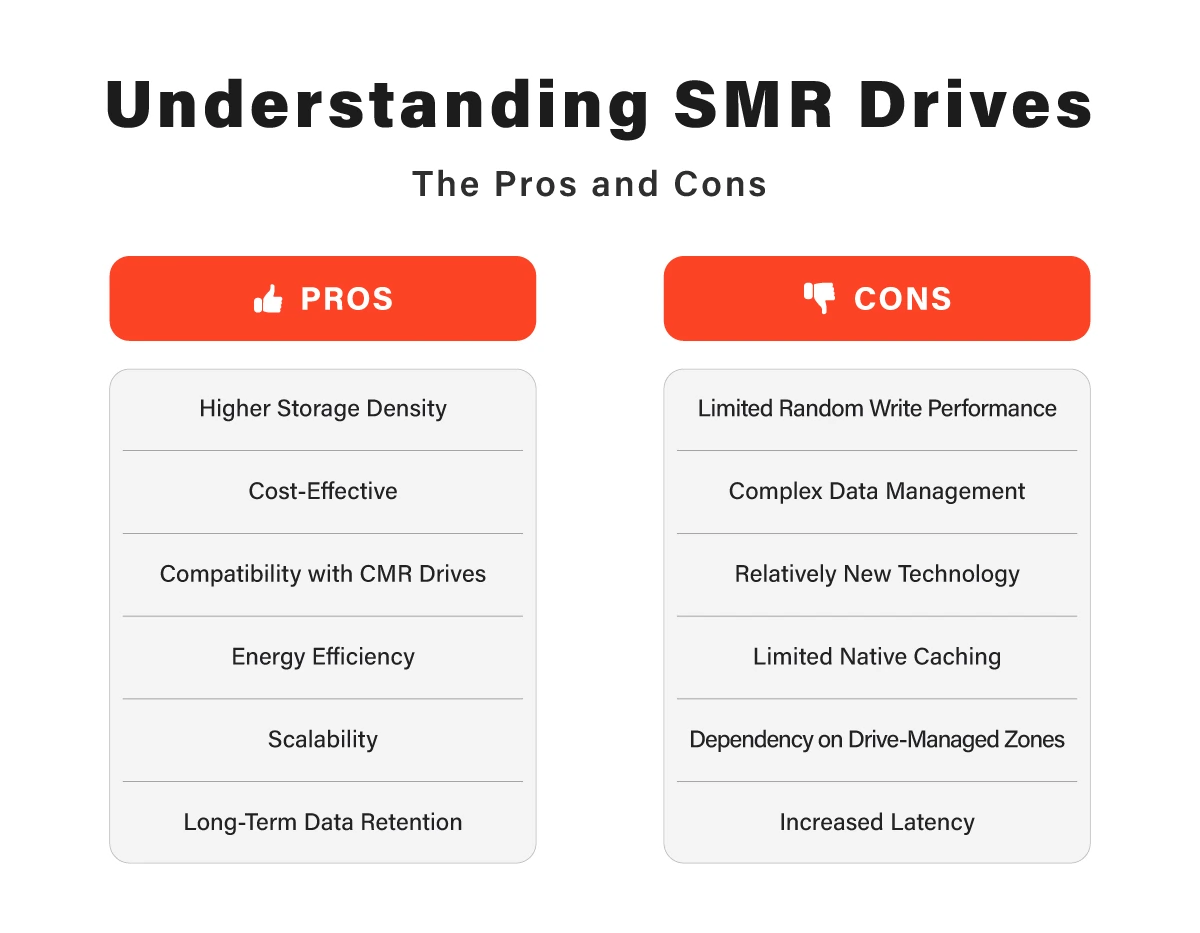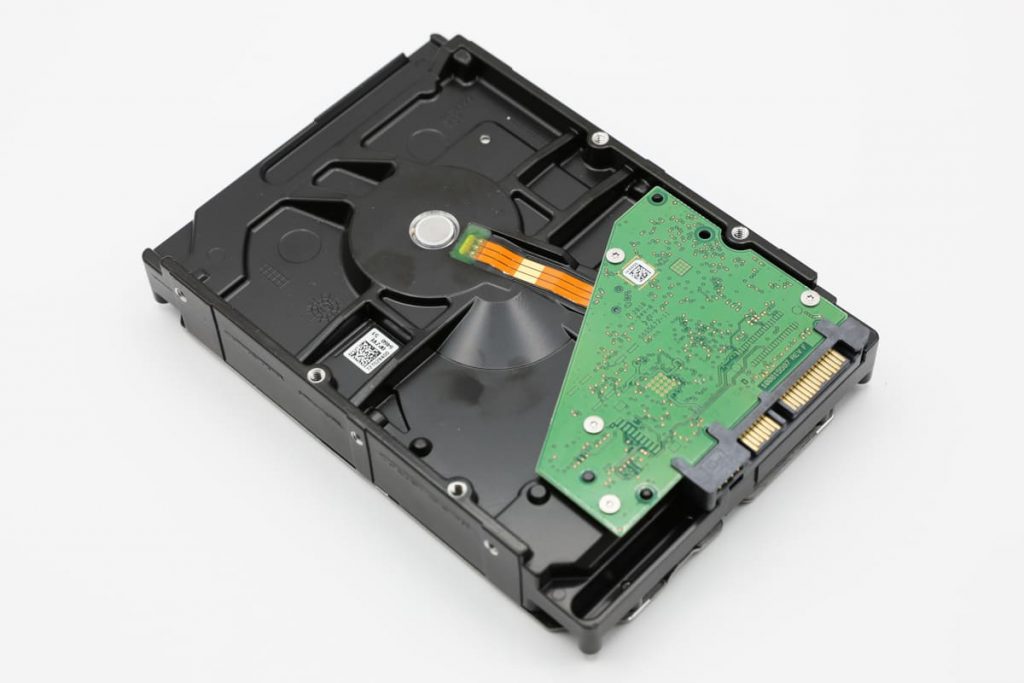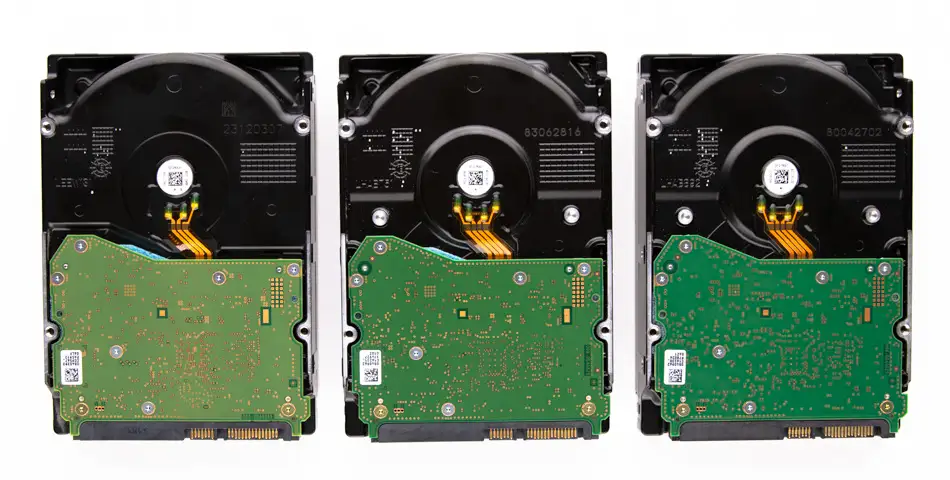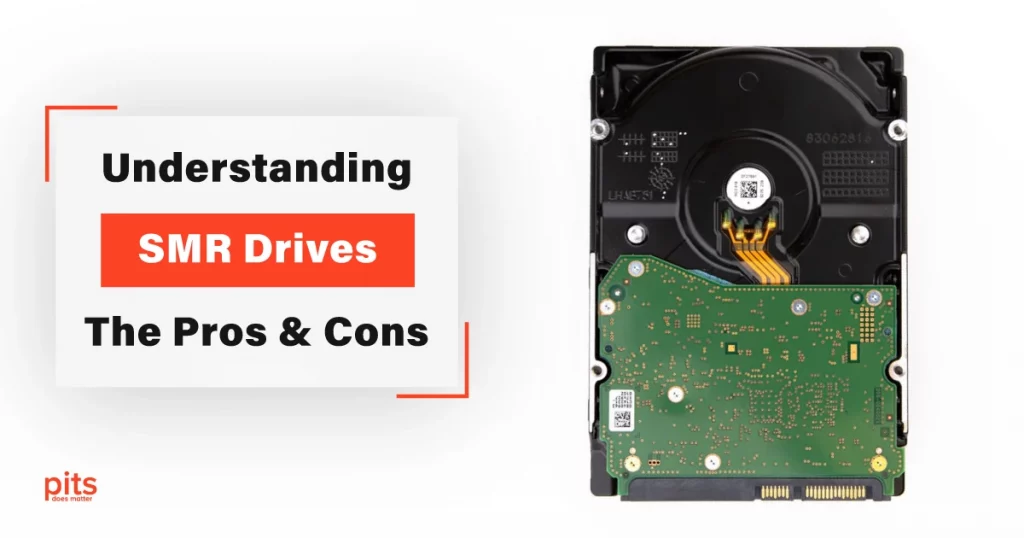In the world of data storage, advancements are constantly being made to meet the growing demand for larger capacities and higher performance. One such innovation is SMR (Shingled Magnetic Recording) drives. These drives have gained attention for their ability to offer higher storage densities compared to conventional disk drives. In this blog post, we will explore what SMR drives are, how they work, and delve into their pros and cons.
What is an SMR Drive and How Does it Work?
SMR drives, based on the Shingled Magnetic Recording technology, are a type of disk drive used for data storage. Unlike traditional drives that use Perpendicular Magnetic Recording (PMR) or Conventional Magnetic Recording (CMR) technology, SMR drives partially overlap the tracks on the disk, resulting in increased storage capacity.

SMR drives achieve their higher storage densities by arranging the individual tracks on the disk in a shingled pattern. This shingling allows the tracks to partially overlap, with each track covering a small portion of the previous one.
When data is written, the writing head lays down narrower tracks, ensuring that adjacent tracks are not affected. However, due to the overlapping nature of SMR, random write operations can be slower.
Pros of SMR Drives
- Higher Storage Densities. SMR drives offer significantly higher storage capacities compared to CMR technology, making them ideal for applications that require large amounts of data storage.
- Cost-Effective. The increased storage density of SMR drives allows for better cost efficiency in price per gigabyte of storage.
- Compatibility with CMR Drives. SMR drives can coexist with CMR drives, enabling seamless integration and data transfer between the two technologies.

Cons of SMR Drives
- Limited Random Write Performance. Random write operations can be slower on SMR drives due to the need for rewriting adjacent tracks during the overlapping process, making them less suitable for workloads that heavily rely on random writes.

- Complex Data Management. The overlapping nature of SMR drives requires advanced data management techniques and specialized firmware to optimize performance and prevent data corruption.
- Relatively New Technology. They are a relatively new technology, and their widespread adoption is still in progress. Consequently, support from all operating systems, software, and hardware may not be universally available.
SMR drives, with their higher storage densities and cost-effective nature, offer a promising solution for storing large amounts of data. However, they come with certain limitations, such as reduced random write performance and the need for advanced data management techniques.
As the technology continues to evolve, it is essential to consider the specific use case and workload requirements when deciding whether to adopt SMR drives. Ultimately, a comprehensive evaluation of the pros and cons will help determine if SMR drives are the right choice for your data storage needs.
Our Data Recovery Services for SMR drives
PITS Global Data Recovery Services is a trusted provider of data recovery solutions for both CMR and SMR drives. With our skilled technicians and advanced tools, we specialize in recovering data from even the most intricate and challenging cases.
Our highly qualified engineers are well-equipped to handle any data loss scenario. Whether your drive has suffered physical damage, mechanical failure, or logical errors, our team is here to assist you.

If you’re facing a data loss situation, don’t hesitate to contact us. Our 24/7 data recovery services are available to you, 365 days a year. Let us help you recover your precious data today.

We start the recovery process with a risk-free evaluation. Our technicians estimate reasons for data loss and the level of damage. Based on it, we select the most suitable recovery strategy.

With years in the data recovery industry, our company supports the highest customer satisfaction rate. We do everything to provide a positive experience for our clients.

During our remote customer file verification session, you will thoroughly review all necessary documents and records to ensure accuracy and compliance.

We offer data recovery services from over 50 locations across the US. This means that no matter where you are located, you can access our services to recover the data.

With our certified data recovery services and 99% success rate, we are confident that we can recover your precious data and get you back up and running in no time.
At PITS Global Data Recovery Services, we understand the significance of your hard drive data and the potential impact of data loss on your business or personal life. Hence, we offer prompt and dependable data recovery services for CMR and SMR drives. Our dedicated team works tirelessly around the clock to ensure your data is recovered quickly and efficiently.
If you have experienced data loss on your CMR or SMR drive, don’t hesitate to contact PITS Global Data Recovery Services today. We will collaborate with you to develop a customized data recovery plan that addresses your specific needs and requirements.
Frequently Asked Questions
What is an SMR drive, and how does it differ from traditional hard disk drives (HDDs)?
SMR, or Shingled Magnetic Recording, is a technology used in hard disk drives (HDDs) to achieve higher storage capacities. Unlike traditional HDDs that use Perpendicular Magnetic Recording (PMR) or Conventional Magnetic Recording (CMR) technology, SMR drives partially overlap the tracks, allowing for greater storage density within the same physical space. This overlapping enables more data to be stored, but it also introduces certain performance characteristics that differ from traditional HDDs.
What are the advantages of SMR drives?
SMR drives offer several advantages, including higher storage densities. By packing data more tightly on the drive, SMR drives can store larger amounts of data in a given physical footprint. This makes them cost-effective for scenarios that require substantial storage capacity. SMR drives are also designed to be compatible with existing systems, allowing for a smooth integration without significant infrastructure changes.
What are the disadvantages of SMR drives?
SMR drives have a few limitations that users should be aware of. One notable drawback is their slower write performance compared to traditional HDDs. Due to the overlapping nature of tracks, modifying data on an SMR drive requires rewriting adjacent tracks, leading to increased write latency. Additionally, SMR drives are not well-suited for heavy random write operations, as the need to rewrite multiple adjacent tracks can result in performance degradation. These factors make SMR drives more suitable for workloads that prioritize sequential write operations over random writes.
Can SMR drives be used as a replacement for solid-state drives (SSDs)?
While SMR drives offer higher storage capacities compared to SSDs, they differ significantly in terms of performance characteristics. SSDs excel in fast read and write speeds, as well as handling random write operations efficiently. On the other hand, SMR drives prioritize storage density and cost-effectiveness. The choice between SMR drives and SSDs depends on the specific requirements of the application. If fast performance and random write operations are crucial, SSDs may be a better fit despite their higher cost per gigabyte. However, if storage capacity and cost-effectiveness are prioritized, SMR drives may be a suitable choice.
What are some popular manufacturers of SMR drives?
Western Digital is a notable manufacturer that produces SMR drives and has been at the forefront of developing and implementing SMR technology. Their SMR drives have gained recognition in the market for their high storage densities and compatibility with existing systems. However, other manufacturers also offer SMR drives, providing users with a range of options to choose from based on their specific needs and requirements.
